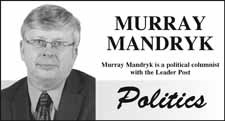As discussed before, there isn't much to suggest that rural voters are looking for other alternatives than the Saskatchewan Party.
But consider why the Sask. Party margins of victory were so large in 2011 in so many rural seats.
Times were prosperous in Premier Brad Wall's first term - good news for the Sask. Party, given that Saskatchewan's political history has seen all governments except one received two terms.
Admittedly times are still pretty good. And the Wall government still has remarkably little baggage compared with its NDP and Progressive Conservative predecessors after their second terms. It doesn't have a record of rural hospital closures or deficit budgets.
That said, it's impossible to keep everyone happy forever. It would be even more surprising if we didn't see at least some tiny cracks in the Sask. Party government's bedrock rural foundation due to flooding compensation, health care spending or whatever other frustration issues that may be out there.
Of course, that in no way means that the NDP is suddenly going to be a force in rural Saskatchewan. Memories of past NDP administrations are long. New Democrats will be fortunate if they win a single seat.
That said, the amazing magnitude of Wall's win in 2011 can at least be partly attributed to how disliked former NDP leader Dwain Lingenfelter was. New NDP leader Cam Broten is considerably more likeable and the NDP will be four more years removed from its record in government _ perhaps not long-enough for some in rural Saskatchewan with long memories, but maybe time enough for a few disgruntled voters to forgive them.
Then there was the issue of the lack of alternative in for voters to express any frustrations they might have had in 2011. Most rural seats didn't have a Liberal or a Progressive Conservative candidate as an alternative in the last election.
And Saskatchewan`s Green Party was a disorganized and irrelevant mess. It`s leader had quit to go work for the NDP shortly before the 2011 vote and it didn't exactly have a platform to which rural voters could relate.
Well, a couple of those elements have changed at least a little.
There is still no sign of a provincial Liberal revival despite the success of federal leader Justin Trudeau.
But, as discussed in this space last week, the PCs under Rick Swenson now have the dollars and the wherewithal to mount campaigns in most rural seats. They likely won't threaten any Sask. Party seats, but they may provide a place to park disgruntled votes.
And while the Green Party of Saskatchewan as a one-issue fringe party has long been scoffed at for being of little relevance, the Greens seem to making some effort to attempt to change that.
"This is a made-in-Saskatchewan experiment," said John Murney, Green Party campaign co-ordinator. "We are building a coalition with environmental issues at the core, but we much more diversified that."
While the Greens aren't shying away from environmental issues, Murney said the plan isn't to shove the issue don't voters throats.
"If you want to discuss climate change with us, you are more than welcome to do so," Murney said. "But we don't want to argue with people. I think that would be a mistake. People are tired of being told what to do and what to think."
Similarly, while the Greens preference remains organic farming, Murney said the Saskatchewan Greens in no way opposes convention farming with chemicals.
The Green's focus will be on ways to keep rural communities more sustainable, Murney said, vowing that his party will run a real campaign to which voters can relate.
Will any of this translate into anyone other than Sask. Party candidates winning rural seats? Well, that seems highly doubtful.
But it does seem that rural voters will have more choice in the next election.
Murray Mandryk has been covering provincial politics for over 22 years.




